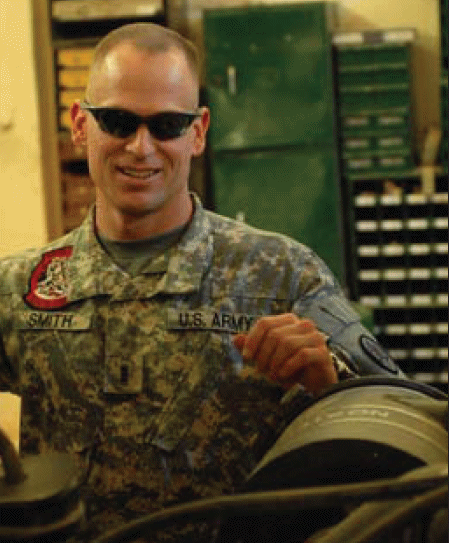
Chief Warrant Officer 3 Christian Smith, a Villa Grove, Ill., native, stands at the open hood of a military humvee
May 16. Smith is the squadron maintenance technician for 4th Squadron, 3d Armored Cavalry Regiment, Task Force XII, Multi-National Division – Baghdad.
TF XII maintainer fought for chance to come to Iraq
CAMP TAJI, Iraq
“Chief, what the heck are you doing?”
Chief Warrant Officer 3 Christian Smith, a maintenance technician who had just tripped and fallen to the ground, looked up at his confused motor sergeant. Smith, who hails from Villa Grove, Ill., but was on a deployment to Iraq, had fallen a lot lately.
Something was wrong with his left leg, and he didn’t know what – all he knew was that it made him fall.
“I don’t know,” said Smith. “I just fell. It happens all the time.”
“Well next time, yell ‘incoming’ and I’ll go down with you,” said the sergeant.
The year was 2003, and Smith was deployed with a military police brigade. Over the course of the deployment, he noticed his muscles growing alarmingly weaker.
“It was very humbling – to say the least,” said Smith. “There wasn’t much I could do about it then, but I knew that once I got back from (Iraq), I was going to have to go see a doctor and find out what was going on.”
In February 2005, after multiple visits to doctors, Smith underwent surgery for a herniated disc in his back to help relieve pressure on what his doctor thought was a pinched nerve. It didn’t help. By this time, he couldn’t move the toes of his left foot, and he continued to grow weaker.
Still more visits to more doctors led him to a neurologist. Late in September 2005, he was diagnosed with multifocal motor neuropathy.
“It’s a condition where my body thinks there’s something wrong with the nerves,” said Smith.
“It’s attacking my nerves, and it doesn’t allow good conduction for the signals that tell the muscles to move – but there’s treatment for it.”
He began treatments right away. Every three weeks, he underwent an intravenous immunoglobulin treatment at a local hospital. By this time, Smith’s unit was on mobilization orders for deployment, but he was scheduled to stay with the rear detachment.
“Within four or five days, I started noticing a lot more strength, and by 10 days after that, I could wiggle my toes and keep my left foot up,” he said.
“I went back to the unit and told them the treatment was working. At that point, it was a matter of how the Army medical system was going to handle this.”
The unit deployed. Despite his objections, Smith stayed at Fort Hood.
“The doc said, when he diagnosed me, that this is a legitimate medical condition that would definitely keep me from deploying,” he said.
“He asked me why I’d want to deploy if I didn’t have to.”
“It’s one of those things where, having grown up playing sports, you spend all that time practicing with a team; and, all of a sudden, they go to an away game, out of town, and you’re stuck at home,” he added. “It’s not a good feeling.”
A year and a half later, Smith found himself facing the same situation, this time with a new team. He was newly assigned to Troop R, 4th Squadron 3d Armored Cavalry Regiment, once again on orders for Iraq.
The treatments were working, and Smith said he was determined not to get left behind again. He began what he called a very frustrating process to make himself deployable.
Once again, the doctors said no. A chain of emails revealed one medical professional after another who believed he had no business deploying.
They cited the risk for contamination with possible secondary effects of anaphylaxis or renal failure. They said his understanding of the condition was “oversimplified.”
“My response to those emails was rather lengthy,” he said. “They thought I was oversimplifying the condition, and I thought they were over-exaggerating it.”
In his response, he said he outlined his own research – discussing the shelf life of the medication and the plan that he and squadron surgeon, Maj. Sean Hollonbeck, had come up with to administer the treatments.
“The Army is attempting and perfecting new things in the theater of operation every day,” he wrote. “Why not this?”
“I didn’t think he’d get to go based on seeing the email traffic from the doctors in theater,” said Capt. Jeffery Hernandez, his troop commander. “I never tried to talk him out of it though. He had such a desire to be with the troops and support the mission.”
“I guess I just felt like I’m in the Army to do a job,” Smith said. “Having been left back once, I told my wife, if I can’t deploy and go do what I’ve trained to do, then I shouldn’t be doing this anymore.”
After a successful month at Fort Irwin, California’s National Training Center, during which an enlisted combat medic successfully administered the treatment, the Army finally relented. Smith deployed to Multi-National Division – Baghdad as part of Task Force XII in November, 2007.
.

Wild Thing’s comment…….
What amazing people we have in our military. We are so blessed as a country for these warriors.

Kudos to CWO Smith. He is doing what the majority of American males would never consider doing. CWO Smith is buying our freedom and paying back those who have paid for that freedom in the past.
What dedication, we are fortunate to have people like that. He’s a family man to boot!!!
Back when I deployed we had two men on medical holds, one had his left shoulder injured by a tree trim saw that had kicked back severing some muscle and tendons, he pitched such a bitch that he shipped out with us in a partial cast on light duty, the other guy was eventually sent to Germany. The man with the bad shoulder drove 5 ton truck within a couple of weeks after we arrived in Quang Tri.
Once again John Kerry, what is your excuse?
Thank you Christian Smith, we are honored by you.
Tom, that is a beautiful way to put it.
“buying our freedom and paying back those who have paid for that freedom in the past.”
Jack oh wow yes, what a huge difference in the likes of John Kerry.